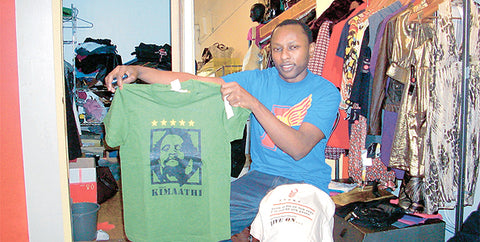African designer turns heads in Harlem
Jamhuri Wear, a collection of street clothing designed by a Kenyan living in New York, is becoming a popular brand in Harlem and in other urban neighbourhoods worldwide.
Jeffrey Kimathi’s company specialises in T-shirts emblazoned with images of Dedan Kimathi, Nelson Mandela and Barack Obama.
Another of the shirts that he designed features the Kenyan flag on the front and the words of the National Anthem (in Kiswahili) on the back.
Jamhuri Wear’s fashions are sold on the internet and in a chic Harlem store that Mr Kimathi shares with Ibrahim Doukoure, a designer from Guinea. Mr Doukoure’s line of clothing gives the shoppe its name: Bebenoir (French for black baby).
Mr Kimathi was the subject of a profile last September in The Daily News, one of the most widely circulated newspapers in New York.
That exposure further heightened the visibility that Jamhuri Wear had acquired via pop stars such as Jay-Z, Akon and Damian Marley. They have all worn Mr Kimathi’s shirts in concert performances.
It’s quite an achievement for a 32-year-old from Nairobi with no formal training as a fashion designer.
“When I was growing up, I always loved clothes and I didn't know how to draw,” Mr Kimathi said in a recent interview at Bebenoir.
But the possibility of becoming a designer never occurred to him during the first 22 years of his life that he spent in Kenya.
Society’s expectation, Mr Kimathi explained, is that an ambitious and well-educated young Kenyan will train as a doctor, a lawyer or a scientist.
“There’s not much thought given to being an artist,” he said.
In addition, many young Kenyans feel that their talents go unrecognised at home, Mr Kimathi said.
“Kenya is an amazing country,” he commented, “but the youth aren’t being encouraged. Nobody is having a conversation with us.”
Mr Kimathi thus decided to seek his destiny in the United States.
“America seemed to have something more to offer,” he said. “If you have a dream, you can chase it there.”
Kenyan girl
When he left for the US in 1998, Mr Kimathi was also “chasing a Kenyan girl.” He caught her, and they lived together for a couple of years in Dallas, where Mr Kimathi worked at jobs unconnected to fashion.
“But something told me I had to get to New York,” he recalled.
And so he moved to the Big Apple in 2001, shortly after the terrorist attacks that levelled the Twin Towers.
Mr Kimathi stayed with a Kenyan friend in a flat in Harlem, the Manhattan district that, he notes, “has been the Mecca for African-Americans and some Africans too.”
Mr Kimathi says he loves living amidst the history, diversity and dynamism of Harlem but has found it difficult to get to know some black New Yorkers.
“There’s a disconnect between African-Americans and Africans,” he observed.
“They have their own ideas of what an African should look like and act like. People generally are afraid of things that are different.”
Because of his African heritage, President Obama may help change those attitudes, Mr Kimathi suggests. He says there is already noticeably greater respect for and interest in Africa among black Americans.
Mr Kimathi and his business partner, Mr Doukoure, say they constantly strive to market Africa itself as well as their own clothing lines.
“We’re like unofficial ambassadors,” Mr Doukoure said. “We’re as much about increasing understanding of Africa as we are about being fashion designers.”
Soon after arriving in New York in 2001, Mr Kimathi experienced a sudden awareness that Africa was barely represented on the international fashion scene. And so he resolved that “I would be the one to tell that story to the world.”
Mr Kimathi got a job moving boxes at Ecko Unlimited, a well-known fashion house in New York. Six months later, he was promoted to the design department. And a couple of years after that, he went to work for MTV.
Jamhuri wear
By 2005, however, Mr Kimathi felt that he was not being challenged sufficiently. It was then that he launched Jamhuri Wear. His company’s first design was based on a photo of Dedan Kimathi — for whom he had been named.
Mr Kimathi’s mother, Mercy Twerandu, still runs an import-export business in Nairobi called Mezikat. She taught him to be proud of his Kenyan heritage, Mr Kimathi notes.
He plans to return home for a visit this summer. It will be the first time Mr Kimathi has been to Kenya since coming to the US nearly 11 years ago.
One day, he says, he will settle in Kenya, despite his love for New York and his status as what he terms “a nomad, or an Afropolitan.”
Kenyan manufacturers
Mr Kimathi intends to assess factory capacity and marketing resources in Kenya this summer. The textiles he uses for the Jamhuri Wear line are made in Lesotho, Tanzania and Uganda, and he says he would like to add Kenyan manufacturers to the company’s list of suppliers.
He also has two dreams: “opening shops in Africa where I could sell Jamhuri Wear” and “helping make it possible for Kenyan youth tap their talents at home.”

